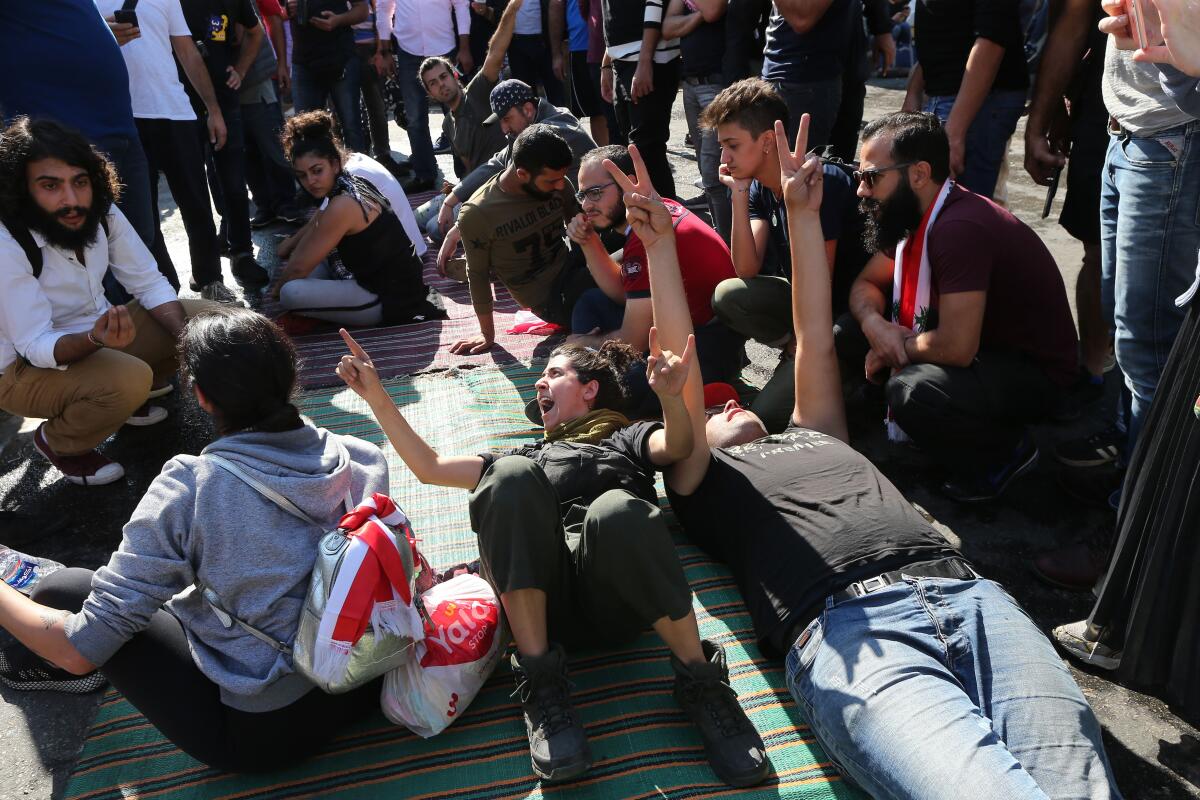Hezbollah’s road to power in Lebanon just got harder

- Share via
BEIRUT — The resignation of Lebanese Prime Minister Saad Hariri was a victory for anti-government protesters flooding the country’s streets by the millions. It also was a wake-up call for Hezbollah, the Shiite Muslim organization that wields substantial power in the region and is regarded as a terrorist organization by the United States.
The group, which is aligned with Iran and is considered a dangerous foe by Israel, cemented its political clout in elections last year. It has wielded that power in a coalition government to maintain the arsenal of weapons it says it needs to fight Israel and protect its people.
Yet the protests that drove out Hariri on Tuesday present a challenge to Hezbollah.
On the one hand, it would seem to have common cause with the demonstrators, who are demanding an end to government corruption. Decaying infrastructure, intermittent electricity and water, little work and high prices all contributed to some of the largest demonstrations Lebanon has ever seen. Hezbollah also has railed against corruption, and has a reputation in Lebanon for being relatively untainted by it.
At the same time, the organization has become a pillar and protector of the political establishment, the target of the protesters’ ire. That anger could wind up being redirected at Hezbollah.
The protests spread far beyond the Lebanese capital, Beirut, including south Lebanon, which is dominated by the country’s Shiite Muslims and where Hezbollah expects to have total support.
Across the south, in cities such as Sour, Nabatiyeh and Kfar Roummane, hundreds of demonstrators gathered in public squares. Like their counterparts in Beirut and elsewhere, they repeated “All of them means all of them,” a signature slogan that demands all politicians leave.
For Hezbollah, which maintains what it portrays as a benevolent, almost paternalistic control of the south, the dissent was a surprise.
And the protests persisted, even after Hezbollah’s leader Hassan Nasrallah said the government should stay. The uprisings, he said, had been co-opted by foreign powers antagonistic to Hezbollah. He instructed his supporters to leave the streets; others, he said, could remain and protest if they wanted to, but the roads would have to be reopened to allow the resumption of daily life.. He insisted he didn’t fear for “the resistance,” the catch-all term referring to Hezbollah and its supporters, but for the whole country.
But his arguments left many unconvinced.
“The resistance cannot be victorious if people are starving,” said Farah Qubaisi, a 32-year-old academic and feminist activist protesting in Nabatiyeh. “Hezbollah says it wants to help people, then it should stand with them.”
Hezbollah is considered less corrupt than its counterparts, and often more effective than the state, with cadres better equipped than the Lebanese army, and an impressive social works component it marshals to give better services to its constituents.
But Hezbollah’s problem is its allies in government, including two deeply unpopular figures, Nabih Berri and Gebran Bassil.
Berri, the octogenarian parliament speaker and head of the Shiite party Amal, is widely viewed as an exemplar of the country’s venal political class.
Bassil, Lebanese President Michel Aoun’s son-in-law as well as the country’s foreign minister, heads a party that is Hezbollah’s top partner in the coalition government. So visceral is the hatred of Bassil that demonstrators took up a chant repeatedly mentioning his mother’s reproductive organs, albeit in far cruder fashion.
Yet those alliances have been expedient for Hezbollah, said Heiko Wimmen, a Lebanon expert with the International Crisis Group. They’ve allowed it to maintain a political order in which it keeps its weapons from being taken away while protecting the interests of its base. A change in the status quo, ailing as it is, could threaten all that.
“They’re in the most comfortable domestic setup they’ve ever been,” Wimmen said in a phone interview on Wednesday. “They could have formed their own majority government, but they’re in a government legitimized by having other parties, which shields them from the U.S. and its sanctions.”
In the days after Nasrallah’s speech, and as protesters continued to block roads, grumblings began to percolate among pro-Hezbollah commentators, warning that road closures were bringing people to economic ruin and that the Lebanese army, by not forcibly removing them, was failing to protect people.
Tuesday brought the harbinger of what a sectarian-tinged schism could bring. That afternoon, party thugs said to be supporters of Amal and Hezbollah descended on Beirut’s downtown district. They skirmished with protesters to destroy the makeshift barriers they had placed on a main highway before going on a rampage through their encampments.
Video of the clashes released on social media showed hordes of the young men ripping signs, tearing down tents and setting fire to what equipment they could find. Protesters who stood in their way were beaten down or chased away by a hail of bottles and rocks. Security forces did little to stop the attack.
Protesters soon came back to clean up the damage. Hours later, people were again swarming the protest camp; many said the attack had actually shaken away the fatigue that had begun to set in after weeks of demonstrations.
But the violence undoubtedly had a dampening effect. On Wednesday, protesters acquiesced to roadblocks being removed and allowed traffic to resume in downtown Beirut and elsewhere. It was perhaps a win for Nasrallah but one that brought criticism even from his own base.
With Hariri out, Aoun is tasked with replacing the government after consultations with parliament. The protesters have demanded it be staffed with independent technocrats and that it should hold power for a temporary period until early elections can be held.
More to Read
Sign up for Essential California
The most important California stories and recommendations in your inbox every morning.
You may occasionally receive promotional content from the Los Angeles Times.











